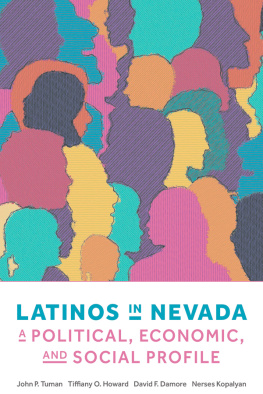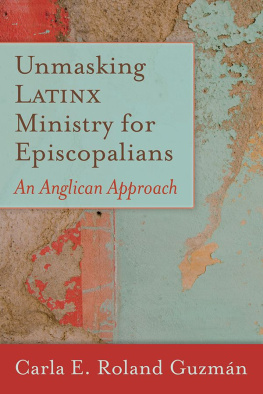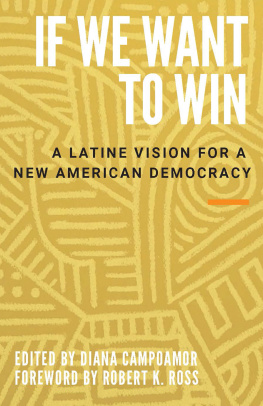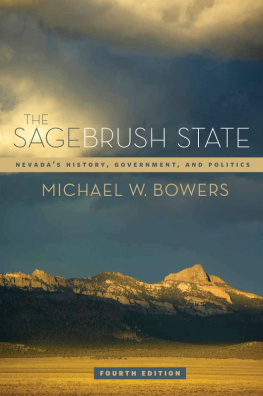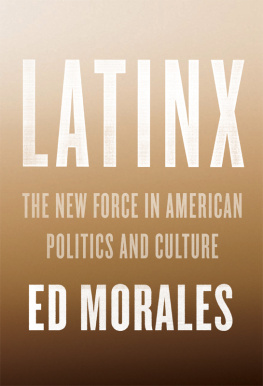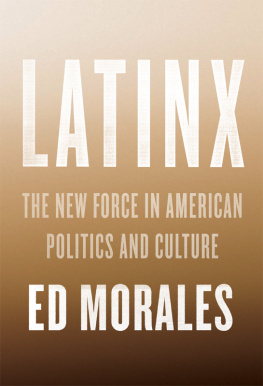About the Authors
JOHN P. TUMAN is a professor of political science and associate dean of faculty in the College of Liberal Arts at the University of Nevada, Las Vegas. He received his PhD from the University of California, Los Angeles, his MA from the University of Chicago, and his BA (High Honors) from the University of California, Berkeley. His research has engaged a number of topics on the political economy of Latin America and Latinos in the US. Tuman is the past president of the Pacific Coast Council of Latin American Studies, and he also served previously as the department chair of political science and as the director of the Institute for Latin American Studies for many years. He is the author, coauthor, and coeditor of several books and edited several volumes. In addition, he has published articles in a number of journals.
DAVID F. DAMORE, PhD, is a professor of political science at the University of Nevada, Las Vegas, where he teaches undergraduate and graduate courses in American politics and research methods and serves as department chair. Damores research focuses on electoral politics and applied public policy. In addition to his position at UNLV, Damore is a nonresident senior fellow in the Brookings Institutions Governance Studies Program, a key vote advisor for Project Vote Smart, and a senior analyst at Latino Decisions. He is also the outgoing president of the Southwestern Political Science Association (201819). Damore regularly comments on Nevada governmental and political issues for local, national, and international media outlets. He earned his PhD from the University of California, Davis (2000), his MA from the University of Georgia (1995), and his BA from the University of California, San Diego (1992), all in political science.
TIFFIANY O. HOWARD, PhD, is an associate professor of political science and the director of the Center for Migration, Demography, and Population Studies (CMDP) at the University of Nevada, Las Vegas. She earned herjoint doctorate in political science and public policy from the University of Michigan-Ann Arbor in 2006 and joined the UNLV faculty in 2008. Her fields of specialization include international security, political violence, and terrorism, immigration and refugee policy, and race, ethnicity, and gender. She has been awarded nationally recognized visiting scholar and research fellow positions, including the Department of Defense-DARPA Research Fellowship (2009), the Ford Foundation Postdoctoral Scholar Fellowship (20132014), the APSA Centennial Center Visiting Scholar Fellowship (2014), the Black Mountain Institute Faculty Fellowship (2015), and the Congressional Black Caucus FoundationCenter for Policy Analysis and ResearchSmall Business and Entrepreneurship Senior Research Fellowship (2019). Howard is the author of The Tragedy of Failure (Praeger Security International/ABC-CLIO, 2010) and Failed States and the Origins of Violence (Routledge, 2014), the coauthor of Sex, Power and Politics: Exploring Gender Roles, Identities and Influence throughout History (Palgrave Macmillan: 2016), and series coeditor of Migration, Demography and Environmental Change: Global Challenges (University of Nevada Press). Other notable peer reviewed publications appear in Civil Wars, Studies in Conflict and Terrorism, the National Political Science Review, the Journal of Political Science Education, and Immigrants and Minorities.
NERSES KOPALYAN, PhD, is an assistant professor-in-residence of political science at the University of Nevada, Las Vegas. His fields of specialization include international relations, political theory, and philosophy of science. Kopalyan has conducted extensive research on analytic philosophy, feminist theory, and paradigm building. Kopalyan is the author of World Political Systems After Polarity (Routledge, 2017), and the coauthor of Sex, Power, and Politics (Palgrave Macmillan, 2016). His current research concentrates on political violence and terrorism and its impact on geopolitical and great power relations.
Acknowledgments
This book grew out of a research project directed by John P. Tuman and David F. Damore, and supported by Brookings Mountain West, a partnership between the Brookings Institution in Washington, DC, and UNLV. Parts of chapters , is adapted and updated from Tuman (2009). His study of Latino civic and political engagement was funded by the Woodrow Wilson International Center for Scholars.
We would like to acknowledge our former students Maria Jos Flor greda, David Snyder, and Samantha Burtch for research assistance. Professor Jaewon Lim also assisted with analysis of the public use microdata samples (PUMS) on interstate migration. In addition, we thank two anonymous reviewers for their extensive comments on the completed manuscript, and Clark Whitehorn, former executive editor of the University of Nevada Press, for helping to bring this book to fruition. We are also grateful for the support of JoAnne Banducci in procuring a Nevada Humanities publication grant, and the assistance of Sara Vlez Mallea, Sara Hendricksen, and Iris Saltus, all with the University of Nevada Press. Paul Szydelko, our copyeditor, provided useful comments that enhanced the quality of the book. The university community has also provided a great deal of support along the way. In particular, we are thankful to our colleagues in the Department of Political Science and the Liberal Arts Deans Office. Finally, we thank our families for support.
Appendix
A. Data Sources
Analysis presented in chapters employs data from several sources, allowing us to capture dimensions of Latino political behavior over time and at different levels. Many of these sources raise methodological issues, however, because of concerns about their ability to measure the behavior of a representative cross-section of Nevadas Latino population. In particular, evidence from 2012 in Nevada and nationally for prior cycles reveals that attempts to assess the preferences of Latino voters consistently under-sample segments of the Latino population that are the most Democratic leaning (e.g., young and first-time voters and less educated and poorer Latinos). In what follows, we detail some of the specific issues surrounding the data sources used in our analysis.
1. Exit Polls
To estimate the Latino share of the Nevada electorate in we use data from the Voter News Service (2000 and 2002) and National Election Pool (NEP) exit polls (20042012) for Nevada. The main concern with these data is their ability to estimate the vote preferences of the Latino electorate. However, because we use these data to assess the share of the Nevada electorate that was Latino, as opposed to the vote choice of Latino voters, this issue has less bearing on our analysis. A more significant concern is that exit polling does not survey voters who cast their ballots early, an increasingly common practice in Nevada. Thus, the degree to which the demographic characteristics of early voters differ from Election Day voters could be a source of error in estimating the racial and ethnic composition of the Nevada electorate.
2. Current Population Survey (CPS)
The CPS is a monthly national survey conducted by the US Census Bureau that yields a sample of 50,000 occupied households. The survey employs in-person and telephone interviews. Each state sample is conducted independently, and results are weighted to reflect updated census estimates. Because the CPS uses probability sampling to select respondents, the estimates it provides are subject to sampling variation. Unfortunately, the error margins for the CPS estimates can be quite large, particularly for minority groups. Thus, the data presented in figures should be interpreted cautiously given the large confidence intervals for some of these estimates.

